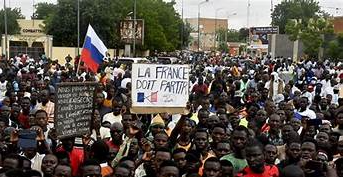Neocolonialism is giving birth to a wretched authoritarianism.
When Islamist forces staged a series of military coups in Central Africa – Niger, Mali, Burkina Faso – with the open support of Russians from the Wagner Group, two narratives emerged in the media. The pro-Russian one sees a rebellion of the people against French neocolonialism, linked to local corrupted elites. Meanwhile, the Western media sees aspects of a large-scale plot by Islamists and Russia to establish an anti-Western and anti-liberal empire in Central Africa. They are both right – up to a point.
It is true that, until now, France has exerted a subtle (or sometimes not so subtle) neocolonial rule over its former West and Central African colonies. After France granted them independence in the 1960s, peacefully, it continued to exert economic, political, and military influence in la Françafrique. France retains the largest military presence in Africa of any former colonial power; it forces African countries to give preference to French interests and companies in the field of public procurement and public bidding. It imposed on its ex-colonies the African Financial Community (CFA) franc monetary zone, which is inherently unequal and rooted in exploitative practices.
The narrative of neocolonialism is not new but has been an enduring critique of Western influence in Africa. The exploitation of Africa’s resources, coupled with the maintenance of political and economic structures that benefit the West, has led to widespread resentment across the continent. The continued dominance of French businesses and the persistent military presence of Western powers have fueled the perception that African nations have not truly gained independence but are still subject to Western control.
However, this backlash against French neocolonialism is not entirely without complication. The rise of Islamist movements, often fueled by local grievances and external interventions, adds an additional layer to the situation. While these movements claim to be resisting Western domination, they are also complicit in creating authoritarian regimes that have little regard for democratic principles or human rights. Russia, through the Wagner Group, has become a significant player in the region, offering military support and gaining influence in exchange for access to Africa’s resources.
The alliance between local Islamist groups and Russia creates a dangerous paradox: while they challenge the West, they pave the way for a new form of authoritarianism that could be even more oppressive than the colonial powers it seeks to replace. The emergence of military juntas in countries like Mali and Burkina Faso, with support from Russia, signals a shift towards a more authoritarian model of governance that undermines the hopes of democracy and stability in the region.
In this context, the West faces an increasingly difficult challenge. While its history in Africa has been marked by exploitation and intervention, it must now confront the rise of a new form of authoritarianism that is deeply intertwined with local politics, Islamist ideologies, and foreign intervention from Russia. The future of Africa may well hinge on finding a balance between rejecting neocolonialism and avoiding the rise of new forms of tyranny.
For the West, the lesson is clear: as long as it continues to impose its interests through neocolonial practices, it will keep losing influence in Africa. The challenge, then, is not simply about fighting back against Islamist movements or Russian influence but also about reevaluating the Western role in Africa and confronting its historical legacy of exploitation.

